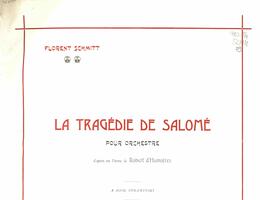La Tragédie de Salomé op. 50

Ballet en un acte, d'après un poème de Robert d'Humières. L'ouvrage est révisé sous la forme d'un poème symphonique en 1910.
“When will your brilliant Salomé finally appear […]? I confess that it is a long time since a work of art has caused me so much joy. […] Believe me, I’m really proud that it has been dedicated to me.” It was with these words that Stravinsky thanked Florent Schmitt for his Tragédie de Salomé. Based on a poem by Robert d’Humières, the score was written in 1907 for a ballet danced by Loïe Fuller and conducted by Ingelbrecht at the Théâtre des Arts on 9 November, that same year. Four years later, Schmitt reduced its length by half and adapted it for large orchestra, turning it into a true symphonic poem, dedicated to Stravinsky and premiered on 8 January 1911 at the Concerts Colonne, under the baton of Pierné. The daughter of Herodias, Salome seduces her uncle Herod in order to demand the head of the prophet, John the Baptist. Schmitt uses this theme to paint a portrait that combines an exoticism overflowing with sensuality with a brutality rooted in the darker instincts of the human psyche. A lush “Prélude” describes the landscape of Judea surrounding Herod’s Palace. The arabesques and heady sonorities of this number alone make Schmitt one of the leading French Orientalists. In “Les enchantements sur la mer” (The Enchantments of the Sea), a haunting threnody (“taken down on the shores of the Dead Sea”, according to a note in the score) is given to a solo soprano (or oboe). After the “Danse des éclairs” (Dance of Lightning), which illustrates the beheading of John the Baptist, the “Danse de l’effroi” (Dance of Terror) erupts with unexpected violence. This number was to remain unique until the appearance of a certain Sacre du printemps (Rite of Spring), six years later, whose innovative rhythmic features would have been unthinkable without the magnificent Tragédie de Salomé.


